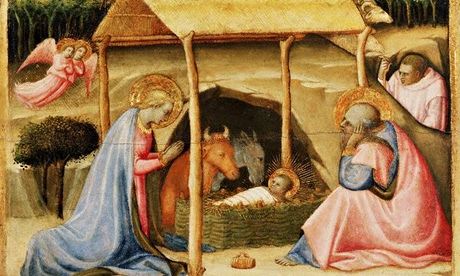Jesus was not born in a stable, says theologian
Rev Ian Paul writes on his blog that birth of Christ story is based on a misreading of the New Testament

The birth of Christ may be the most famous Bible story of all, reprised annually in nativity scenes across the world each Christmas: Jesus was born in a stable, because there was no room at the inn. But evangelical scholar Rev Ian Paul has argued that the entire story may be based on a misreading of the New Testament, reviving an ancient theory that Jesus was not, in fact, born in a stable.
“I am sorry to spoil your preparations for Christmas before the Christmas lights have even gone up,” Rev Paul, a theologian and former Dean of Studies at St John’s theological college, Nottingham, has written on his personal blog. “But Jesus wasn’t born in a stable, and, curiously, the New Testament hardly even hints that this might have been the case.”
Paul argues that the Greek word, kataluma, usually translated as “Inn” was in fact used for a reception room in a private house – the same term is used to describe the “upper room” where Jesus and his disciples ate the last supper. An entirely different word, pandocheion, is used to describe an “Inn” or any other place where strangers are welcomed.
Even if there were an inn in Bethlehem, Paul argues, Joseph and Mary would not have been staying there. The only reason for them to travel to Bethlehem for the census was because he had family there and if he did, the customs of first-century Palestine required him to stay with relatives and not with strangers.
In that context, the kataluma where he stayed would not have been an Inn, but a guest room in the house of the family where Joseph and Mary were staying. That could very well have been full with other relatives who had arrived before them.
“The actual design of Palestinian homes (even to the present day) makes sense of the whole story,” Paul writes. “Most families would live in a single-room house, with a lower compartment for animals to be brought in at night, and either a room at the back for visitors, or space on the roof. The family living area would usually have hollows in the ground, filled with straw, in the living area, where the animals would feed.”
So Jesus would not have been born in a detached stable, but in the lower floor of a peasant house, where the animals were kept.
This interpretation is hardly new. The earliest scholar to put it forward was the Spaniard Francisco Sánchez de las Brozas, in 1584. He was denounced to the inquisition for his pains and reprimanded by them, though not actually burned, tortured or imprisoned as might have happened to heretics.
Since then the theory has repeatedly been raised by New Testament greek scholars aware that kataluma does not actually mean “Inn”. Paul himself first wrote about the misinterpretation of the word in 2013, and re-posted his theory this year “because I have been struck again how often the message of Christmas is summed up as ‘Jesus was born in a stable’, both within and beyond the church.”
For Paul, the significance of his reinterpretation of the story is that it undercuts the idea that what made Jesus remarkable was that he was born to humble, outcast parents. “In the Christmas story, Jesus is not sad and lonely, some distance away in the manger, needing our sympathy. He is in the midst of the family, and all the visiting relations, right in the thick of it and demanding our attention,” he writes.
“This should fundamentally change our approach to enacting and preaching on the nativity.”
Paul says that what is extraordinary about the birth of Jesus is that it shows God shifting from the divine to the human. If that happened in a crowded family home, the message is preserved. If it happened in an isolated stable, “that just shows that the descent was from a respected human to a disrespected human,” he argues.
沒有留言:
張貼留言